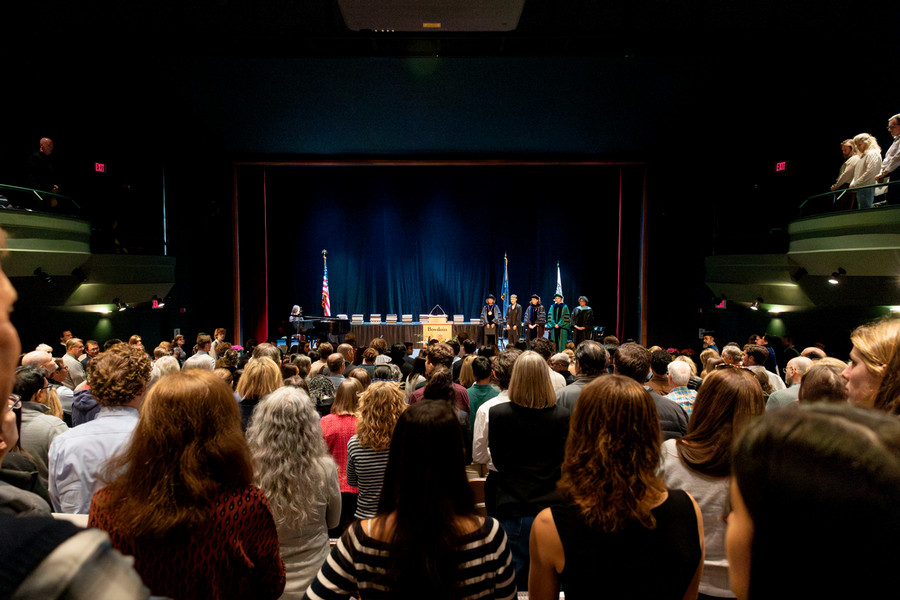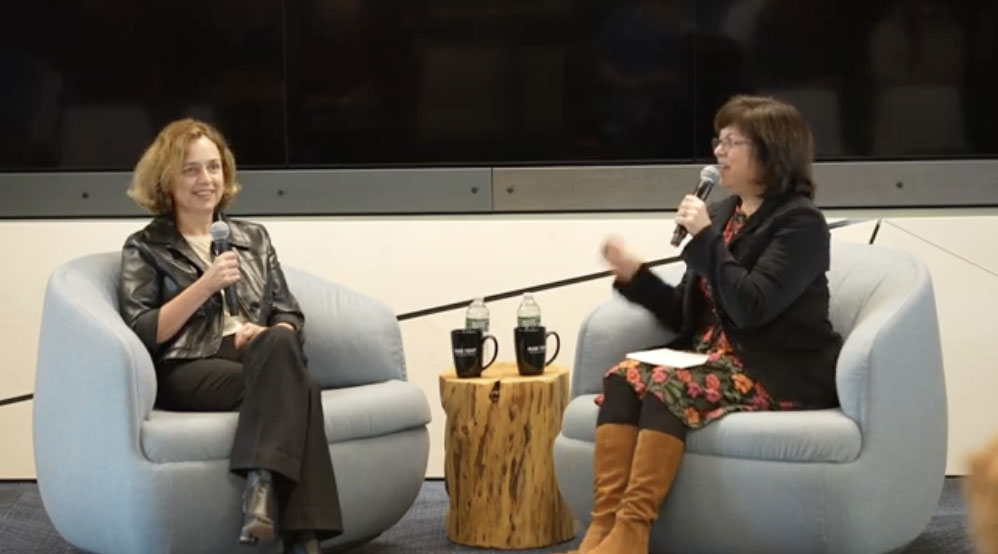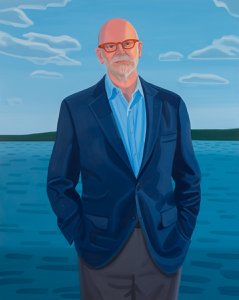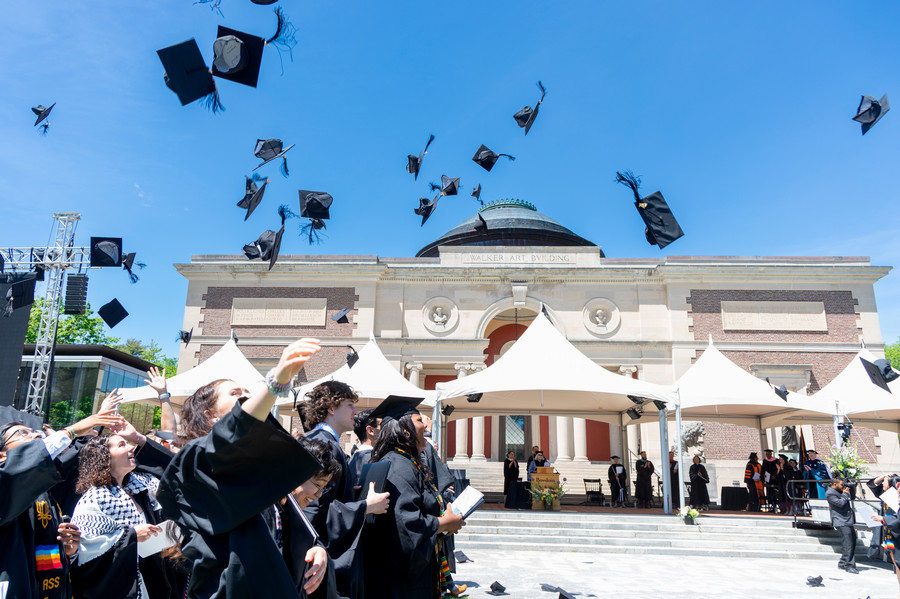Barry Mills: Demonstrating Community
Barry Mills discusses the reality of intolerance and the power of a Bowdoin community that is pushing back.

Spring break is now over and the College is back in session. There are about seven weeks remaining in this semester, and these last few weeks of the academic year are going to feel much like skiing down a double black diamond trail at Sugarloaf!
We had a student-led rally here on the Thursday before break, organized by members of the group, “I am Bowdoin!” On that Thursday afternoon, about 200 people—mostly students but also several members of the faculty and staff—gathered at the polar bear statue outside Sargent Gym. Those in the group placed duct tape over their mouths and walked quietly into Smith Union’s Morrell Lounge where they formed a large circle. One by one, as others gathered on all levels of the union to be a part of this demonstration, each person ripped the tape from their mouth and declared their identity as a unique individual. An example: “I am black, Hispanic, and from Los Angeles, and I am Bowdoin!” Person after person identified themselves in the most personal and genuine manner, ending each statement with, “I am Bowdoin.” The union was filled that afternoon with an entire cross section of our community—the powerfully diverse and committed Bowdoin community.
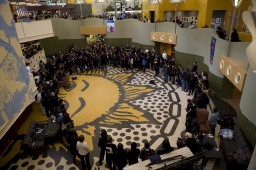
"I am Bowdoin!" Rally (Photo © James Marshall Photography)
I have to admit I was moved beyond words by these positive expressions of identity and commitment to our College. The rally was organized by our students as an expression of their commitment, but also their frustration. It was a well-organized, yet spontaneous event in its message and power. Looking around the room I was enormously impressed by the participants, by the fact that this community now genuinely represents our society and country, and by the message that these students, faculty, and staff were conveying: that they are not simply numbers representing the extent of our diversity, but rather, individuals demanding our respect and their mutual respect for their rightful place on our campus.
The frustration giving rise to this demonstration has been generated by actions on and around campus over recent months and by the community-wide conversations that weren’t happening. This year, some of our students have been harassed verbally in the town of Brunswick and on our neighboring streets. This has happened to a number of students and even to me as we cross the streets bordering campus. Given the words screamed at our students, it is no surprise that some are afraid for their safety. Particularly reprehensible words have been directed aggressively at some of our black students, leading these young women and men to question whether they are welcome here or, even more importantly, whether they are safe.
“…harassment happens everywhere. But at Bowdoin, we are committed to the common good, and the common good starts with a sense of mutual respect and civility.”
—President Barry Mills
Now, I would never suggest that our town is not safe for everyone. And I truly believe that Brunswick is an open, welcoming community. But the reactions of our students to the actions of a few knuckleheads are genuine and valid. I have personally met with local town leaders, the police, the local Rotary, and religious leaders to discuss these issues. I will meet soon with local school leaders. Everyone reacts with shock and can’t believe this happens in our town, and they are eager and enthusiastic about helping us raise awareness on the issue.
I understand the reaction from those of you who say, “Come on. Tough it out. This is the real world and stuff happens.” I know full well that this kind of harassment happens everywhere. But at Bowdoin, we are committed to the common good, and the common good starts with a sense of mutual respect and civility. It is our responsibility to work aggressively to foster such an environment in our own home town. It is also our responsibility to create a sense of security for those at Bowdoin who come to Maine to study, learn, and live on our campus. It has to be unacceptable for us, as members of this community, to have others feel at risk.
“It has to be unacceptable for us, as members of this community, to have others feel at risk.”
—President Barry Mills
The frustration motivating the “I am Bowdoin!” demonstration is also generated by events on our own campus. The most widely known incident was when truly offensive language about race and sexual orientation was written on a whiteboard outside the room of a group of our students. But more subtly, some students just don’t respect each other sufficiently or understand the reality of difference on our campus. This silent and not-so-silent bias plays out in so many ways. People make assumptions about each other without truly spending the time to pierce the convenient narratives. This bias goes to race, sexual orientation, socioeconomic status, religion, and to what people do or say on campus, whether they are liberal, conservative, religious—even athletic.
I believe the frustration that our students feel is generally not grounded in actual acts of bias, although these do occur. Rather, I believe the frustration stems from the perception that—here in our educational community dedicated to the common good—we allow these acts to take place without a concerted effort to challenge assumptions about people, and that we don’t even discuss it.
The conversations do take place, and they are ongoing. The “I am Bowdoin!” demonstration came on the heels of an open meeting on the subject held on a Sunday evening and attended by over 200 people, including many faculty, and staff—a meeting described by Dean Tim Foster as one of the healthiest discussions he’s seen at Bowdoin. The very next day, our faculty issued an unambiguous statement condemning acts of racism and hatred. But I understand the perception that not enough is being said or done proactively, and I applaud our students for pushing the issue.
“Bowdoin is by no means alone as a college dealing with these issues. They are common to all colleges. However, we can take pride in the way our students are confronting these issues here.”
—President Barry Mills
Residential colleges are unique communities. Never again in life will people come to a community where someone else chooses their neighbors and says to the residents: “Live together.” This is particularly relevant to Bowdoin, where the community is so intimate geographically and in numbers. After college, most people create communities for themselves, and live and work with people of their own choosing. In this way, Bowdoin is not a bubble, but a cauldron of difference for people to enjoy and experience. This community is our intentional way of creating life learning for and from the individuals living on our campus.
Bowdoin is by no means alone as a college dealing with these issues. They are common to all colleges. However, we can take pride in the way our students are confronting these issues here. We should encourage our students to continue to grapple with all of this, and it is essential for the leadership of the College to be a part of the effort. Our faculty and staff are also critical participants, but I am personally motivated to encourage our students to take the lead role. We, as a College, should not try to socially-engineer away these tensions, nor should we take over for our students. If students take the lead and continue to push on these issues, the likelihood for positive progress is much greater and the leadership lessons will be profound.
I hesitated to write on this subject for fear that the discussion would be viewed as reflecting poorly on Bowdoin. But I am convinced the these efforts are very positive for our College and reflect accurately what is happening on campus. And, in a society that is powerfully judgmental, a college that is questioning bias and personal assumptions should be celebrated.
